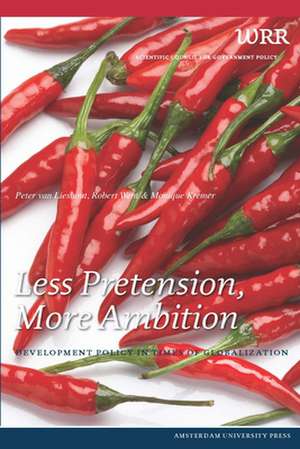Less Pretension, More Ambition: Development Policy in Times of Globalization: WRR
Autor Peter van Lieshout, Robert Went, Monique Kremeren Limba Engleză Paperback – noi 2010
On some levels, the accepted role of development aid has been supplanted by the increase of individual remittances and foreign direct investment, as well as by policies that focus on issues such as climate, migration, financial stability, knowledge, trade, and security in order to increase opportunities in struggling countries. This study considers such changes and examines the effectiveness of aid and its role in international power relations. The editors and contributors close the book by proposing new strategies for development aid in the era of globalization.
Preț: 336.37 lei
Preț vechi: 424.64 lei
-21% Nou
Puncte Express: 505
Preț estimativ în valută:
64.37€ • 67.34$ • 53.47£
64.37€ • 67.34$ • 53.47£
Carte indisponibilă temporar
Doresc să fiu notificat când acest titlu va fi disponibil:
Se trimite...
Preluare comenzi: 021 569.72.76
Specificații
ISBN-13: 9789089642950
ISBN-10: 9089642951
Pagini: 312
Dimensiuni: 152 x 229 x 23 mm
Greutate: 0.5 kg
Editura: Amsterdam University Press
Colecția Amsterdam University Press
Seria WRR
ISBN-10: 9089642951
Pagini: 312
Dimensiuni: 152 x 229 x 23 mm
Greutate: 0.5 kg
Editura: Amsterdam University Press
Colecția Amsterdam University Press
Seria WRR
Notă biografică
Peter Van Lieshout is a member of the Dutch Scientific Council for Government Policy, where Robert Went and Monique Kremer are senior research fellows.
Cuprins
Preface
1. Development aid in a changing context
2. The development aid split
2.1 The basic motives for development aid
2.2 The moral assignment
2.3 Self-interest
2.4 Interdependencies
2.5 How to combine big and small
3. Understanding development
3.1 Defining development
3.2 Other starting points
3.3 Effective governments and path-dependent trajectories
3.4 Political institutions
3.5 Social fabric
3.6 Own development paths
4. Measuring development
4.1 Is development taking place?
4.2 What does aid contribute?
4.3 Should we then focus on the micro level?
4.4 Does aid help?
5. Designing development aid
5.1 Narrowing down: development aid becomes poverty reduction
5.2 Fragmentation: more and more chaotic organization
5.3 Delusions of grandeur: the constant lure of social engineering
5.4 Lack of intervention ethics
5.5 Compartmentalization: underestimating other instruments
6. The task ahead
6.1 Linking will become increasingly unavoidable
6.2 The task: to be more development-oriented, more specific and broader
6.3 The first consequence: become more development-oriented
6.4 The second consequence: being more specific
6.5 The third consequence: being broader
6.6 A dual strategy for development
7. Being more specific: professionalizing aid
7.1 Appropriate aid modalities
7.2 Supporting governments
7.3 Other actors: NGOs for development
7.4 Other actors: businesses for development
7.5 Other actors: citizens for development
7.6 Programme aid
7.7 Doing good can and must be done better
8. A broader perspective: looking beyond aid
8.1 Multilateral aid
8.2 Coherence for development
8.3 International public goods
8.4 Global governance
8.5 Beyond ‘international cooperation’
9. Conclusion
9.1 Development more central
9.2 Professionally organized development
9.3 Beyond classical aid
9.4 Less pretension, more ambition
References
1. Development aid in a changing context
2. The development aid split
2.1 The basic motives for development aid
2.2 The moral assignment
2.3 Self-interest
2.4 Interdependencies
2.5 How to combine big and small
3. Understanding development
3.1 Defining development
3.2 Other starting points
3.3 Effective governments and path-dependent trajectories
3.4 Political institutions
3.5 Social fabric
3.6 Own development paths
4. Measuring development
4.1 Is development taking place?
4.2 What does aid contribute?
4.3 Should we then focus on the micro level?
4.4 Does aid help?
5. Designing development aid
5.1 Narrowing down: development aid becomes poverty reduction
5.2 Fragmentation: more and more chaotic organization
5.3 Delusions of grandeur: the constant lure of social engineering
5.4 Lack of intervention ethics
5.5 Compartmentalization: underestimating other instruments
6. The task ahead
6.1 Linking will become increasingly unavoidable
6.2 The task: to be more development-oriented, more specific and broader
6.3 The first consequence: become more development-oriented
6.4 The second consequence: being more specific
6.5 The third consequence: being broader
6.6 A dual strategy for development
7. Being more specific: professionalizing aid
7.1 Appropriate aid modalities
7.2 Supporting governments
7.3 Other actors: NGOs for development
7.4 Other actors: businesses for development
7.5 Other actors: citizens for development
7.6 Programme aid
7.7 Doing good can and must be done better
8. A broader perspective: looking beyond aid
8.1 Multilateral aid
8.2 Coherence for development
8.3 International public goods
8.4 Global governance
8.5 Beyond ‘international cooperation’
9. Conclusion
9.1 Development more central
9.2 Professionally organized development
9.3 Beyond classical aid
9.4 Less pretension, more ambition
References
